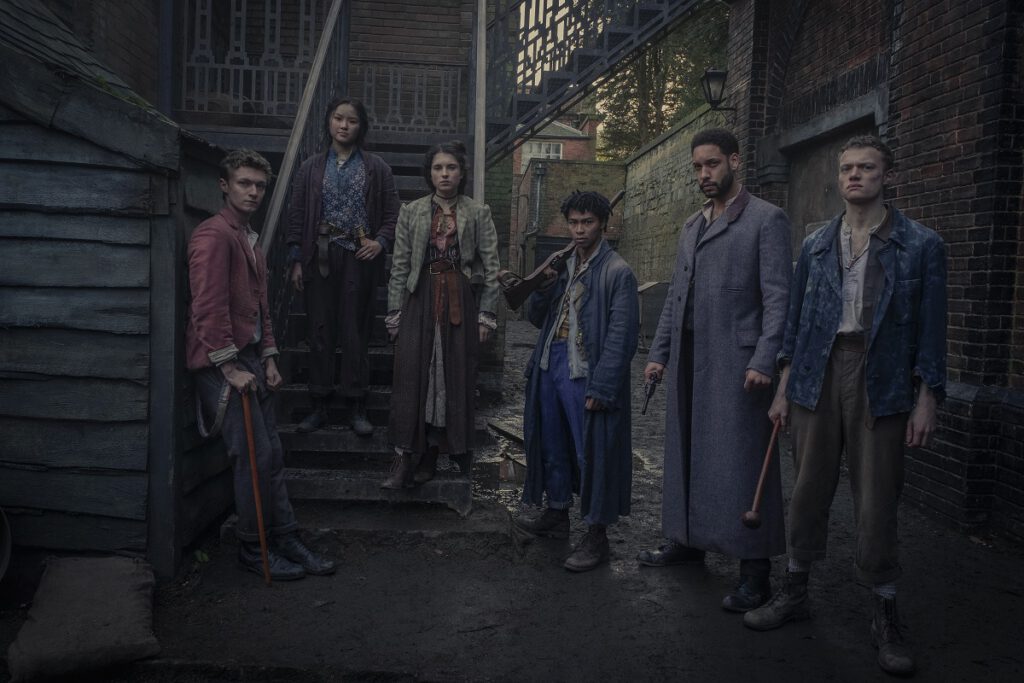Netflix loves Young Adult programming, and everyone who subscribes seems to love period drama lately with the massive success of shows like “Bridgerton” and “The Queen’s Gambit.” So there’s every reason to believe that “The Irregulars,” dropping in its entirety today, March 26th, will be another smash for the king of the streaming services, even if it struggles to live up to its potential to be more than regular TV. I know there are passionate creatives behind it and some of the cast is strong, especially the young actors, but it’s hard to shake that this is the product of a company’s algorithm, something born into existence more from a boardroom than a writer’s room. Despite an interesting idea, it has too many of the common flaws of Netflix original programming. There’s enough talent here to suggest that it could develop into something more interesting in the future, but the real mystery here is how so many interesting individual elements can struggle to form an entertaining whole piece.
The premise of “The Irregulars” is admittedly clever. Sir Arthur Conan Doyle’s Sherlock Holmes often used local kids, street urchins with their ears to the ground, to get the information he needed to solve cases. What if they were doing the actual solving for the drug-addicted Holmes and he was really just taking the credit? Set in Victorian London, “The Irregulars” places a group of distinctly troubled teens into a world of murder mysteries and supernatural events, turning two of the most infamous crime-solvers in history—Doctor Watson (Royce Pierreson) and Sherlock Holmes (Henry Lloyd-Hughes)—into supporting characters who generally give them trouble.

The lead in this period piece is the charming and empowered 17-year-old Bea (Thaddea Graham, a likely future star), the tough-talking head of the gang of unusual crime solvers that give the show its name. Her main drive is to protect her fragile but possibly powerful younger sister Jessie (Darci Shaw) as much as find a form of justice for what’s in front of her. You see, Jessie has psychic powers, and one of the more interesting arcs of “The Irregulars” is embedded in Bea and Jessie merely trying to figure out the truth about their lineage and what the nightmares that haunt Jessie mean for their future.
The young men of “The Irregulars” don’t make as much of an impact as Graham or Shaw, but Harrison Osterfield is the likely fan favorite as Leo, the rich kid who has been trapped in his royal palace for most of his 17 years because he’s a hemophiliac. He falls for Bea and sneaks out to join in their escapades, much to the dismay of Billy (Jojo Macari), who has had an unrequited love thing for Bea himself for most of his life. Finally, there’s Spike (McKell David), the charmer, and, of course, Watson and Holmes themselves. Watson is portrayed as a charismatic manipulator who butts heads with Bea and the gang more than anything else while Holmes struggles with demons and addictions.

There’s an interesting quote from Executive Producer Tom Bidwell in the press notes for “The Irregulars” that says, “It’s quite a unique show with many genres: it’s adventure, it’s horror, it’s crime, it’s romance, it’s fantasy, it’s mystery.” Sure, that’s admirable, but it’s also at the root of the problem with at least the first season of “The Irregulars” in that it’s rarely enough of any of these things. Creators can’t just tick all the genre boxes, the need to make sure each one lands. There’s a fine line between being multi-faceted in terms of genre and just feeling cluttered, and Bidwell’s show falters into the latter too often.
Part of the problem is the direction here too often feels flat and shapeless, bouncing characters around a costume drama in which they don’t always look comfortable or genuine. The show is most effective when it gets the gang together and drops them in an atmospheric setting and case—episode three is a good example of this—but it too often moves them around in different subplots and it doesn’t have the overall craft to make up for its occasional lack of focus. It also really hurts the show to have to run a full 60 minutes when really trimming and tightening it to a more standard 44-minute run time of the old days of episodic dramas might have fixed most of its problems. But then it wouldn’t fit the Netflix system so well, would it?
Five episodes screened for review.












